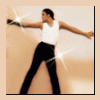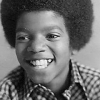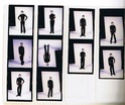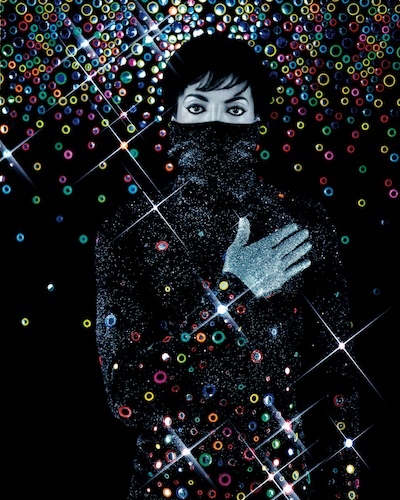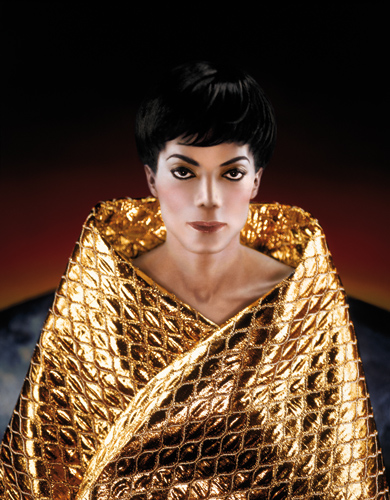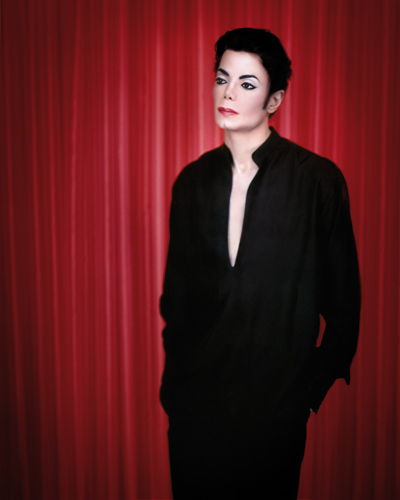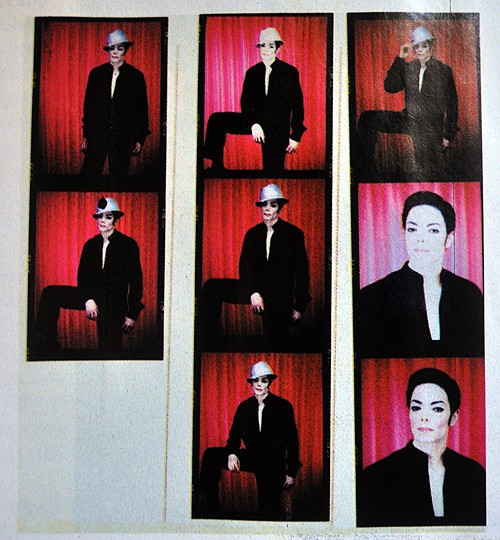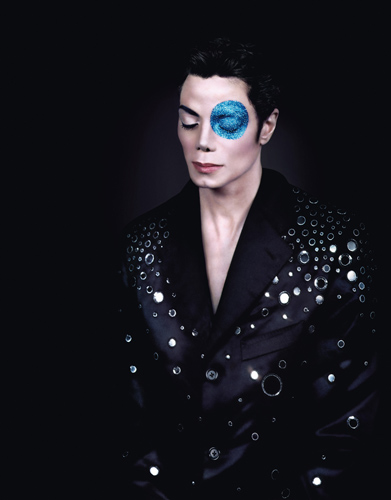15 replies to this topic
#1
 Posted 16 September 2010 - 08:05 AM
Posted 16 September 2010 - 08:05 AM

A new photo has been released on the Internet of the Bani Invincible Cover Shoot of 1999:
http://mjphotoscolle...cover-shootjpg/
We'll add others as they come through...
m
http://mjphotoscolle...cover-shootjpg/
We'll add others as they come through...
m
#2
 Posted 16 September 2010 - 04:02 PM
Posted 16 September 2010 - 04:02 PM

#3
 Posted 16 September 2010 - 05:53 PM
Posted 16 September 2010 - 05:53 PM

Can't wait for more to come, the book release gets nearer 

#4
 Posted 17 September 2010 - 12:44 AM
Posted 17 September 2010 - 12:44 AM

#5
 Posted 21 September 2010 - 05:45 PM
Posted 21 September 2010 - 05:45 PM

Shall be very interesting to see the front on the 8th of October

www.generationjackson.co.uk
#6
 Posted 27 September 2010 - 04:22 PM
Posted 27 September 2010 - 04:22 PM

#7
 Posted 08 October 2010 - 09:38 AM
Posted 08 October 2010 - 09:38 AM

Here is the front of this sphinx picture from Bani
http://mjphotoscolle...i-sphinx-front/
Sources:
mjdatabank.com
perezhilton.com
http://mjphotoscolle...i-sphinx-front/
Sources:
mjdatabank.com
perezhilton.com
#8
 Posted 16 October 2010 - 10:47 AM
Posted 16 October 2010 - 10:47 AM

The new pics posted by Sasha look very interesting:
http://mjphotoscolle...1999-arno-bani/
In this picture, it seems like there are pictures of Michael with a white shirt, too:
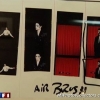
http://mjphotoscolle...1999-arno-bani/
In this picture, it seems like there are pictures of Michael with a white shirt, too:

#10
 Posted 19 October 2010 - 03:03 AM
Posted 19 October 2010 - 03:03 AM

I love the new pictures! Can't wait to see the rest!
Edited by Lari, 19 October 2010 - 03:04 AM.
#11
 Posted 19 October 2010 - 03:03 AM
Posted 19 October 2010 - 03:03 AM

Double post.
Edited by Lari, 19 October 2010 - 03:04 AM.
#12
 Posted 21 October 2010 - 05:51 PM
Posted 21 October 2010 - 05:51 PM

I bought the Arno Bani book today. I haven't read all the text yet. But the photos are brilliant, but my criticism is that very few of the photos are printed at a scale to fill a full page. Most of the photos are printed at a medium/small scale, so they are not tiny but not as big as you would like to really study the photos. But this is still a brilliant book, and it is a shame none of the photos were used for the Invincible album, as many of them are very striking.
#13
 Posted 23 October 2010 - 12:13 PM
Posted 23 October 2010 - 12:13 PM

I was a bit disappointed about that, too, Ben. Apart from the 4 pics that will go on auction, they mostly included contact sheets. Does anyone know if this is a copyright issue? Does Bani only hold the rights to the a handful of pics Michael had chosen back in 1999? There are rumours, I think spread by Karen Faye, that Michael destroyed the pics after the shooting because he didn't like them himself. I'm not sure, could it be a reason that Bani doesn't have the negatives anymore, only these contact sheets?
Here is an interesting article where Bani is talking about the photoshoot:
Never-Before-Seen Michael Jackson Photos Come to Light at Auction
PARIS—Michael Jackson moonwalked to Mozart’s "Requiem" as Arno Bani’s shutter clicked. Sometimes pensive, sometimes smiling serenely, the King of Pop opened himself to the young French photographer. Bani even took the liberty of having Jackson’s hair cut short because he "liked him that way." Afterward, Jackson let it grow back out. "He really didn’t like his own face," Bani said. "With longer hair, he could hide it."
Eleven years since the intimate session, one of the few artistic collaborations ever initiated by the singer, four striking series of photographs will go on the auction block in Paris on December 13.
"We were like two boys playing on the floor, putting puzzles together," said Bani, greeting ARTINFO France in his northern Paris apartment for a talk about the never-before-seen photographs that are today unveiled to the world. "I was a kid then, but he was ten times the kid I was. I would bring glitter pots and he would stick his finger in them and watch how it sparkled. We would spread it everywhere. The fashion design folders were like toy catalogs to him." He added, "Michael Jackson wasn’t just asking me to take pictures. He wanted me to build him a look for the next ten years."
Like what you see? Sign up for ARTINFO's weekly newsletter to get the latest on the market, emerging artists, auctions, galleries, museums, and more.
Surrounding the pair was Jackson’s entourage of artistic directors, clutching notepads, scribbling down whether the King of Pop liked the blue glitter better than the red. "It was the world in which he lived," Bani said, "like seeing him in his little golden prison, discovering. He was extremely curious and cultured, but always humble, respectful, and kind. He would jump on the couch and clap when he fell in love with a new detail. He would give me hugs and bow with his hands together, Japanese-style. I had to ask him to stop thanking me, but I was really very touched."
The project came about by chance. Michael Jackson had spotted a fashion shot by Bani on the cover of the Sunday Times style section and immediately decided that he wanted to work with the young photographer. At first, Bani thought someone was prank calling him, before his lawyer friend confirmed that the King of Pop was inviting him for an audience. Bani would make six return trips to New York ahead of the three-day shoot.
One image, "The Golden Cape," was originally intended for the cover of Michael Jackson’s final studio album "Invincible," but it was nixed by Jackson’s label Epic Records. "It was a great disappointment," said Bani, sitting between his eight-month-old son and a stack of Michael Jackson prints, discarded among the more than 8000 he has signed and dated during the past three months for the collector’s box that will accompany the sale.
The auction by Pierre Bergé & Associés is itself unique. Four large, single-print photographs headline the sale, flanked by 31 contact sheets showing a non-airbrushed Jackson, many with the singer’s handwritten notes. Last, there are 55 prints from the contact sheets. All will be sold without reserve or estimate, starting at €1,000 ($1,410) for the prints and €500 ($705) for the smaller lots. There will be no reprints, no mass-market posters, and no T-shirts, said Frédéric Chambre, vice president and associate at Pierre Bergé & Associés, in his office across from the historic Drouot auction rooms.
The collector’s box, priced at €1,000 ($1,410), will hold a large format catalog and four silver prints of the Bani photographs. A second catalog will be in bookstores for €45 ($63) and, in a rare auction-house nod to the masses, a €19.90 ($28) edition will be sold in supermarkets. Co-editors around the world signed up for translated versions without seeing any of the Bani pictures.
"The project is more rock and roll, or pop, than Pierre Bergé & Associés is used to," Bani said. "We wanted to create something that was edgy and arty but open to a large audience."
Bani was bound by contract to keep the photographs out of public view for 10 years and kept them locked in a safe in southern France. The blockade expired three weeks after Michael Jackson’s death on June 25, 2009. "We decided to take our time," the photographer said. "We didn’t want to drown in everything that was being unearthed for sale following his death, to surf that somewhat morbid wave."
Bani and Jackson had developed an intimate but simple collaboration, where the photographer was given carte blanche to assemble his team and create his vision of the singer. Bani brought along star hairstylist Seb Bascle, makeup innovator Topolino, and fashion trendsetters Frédérique Lorca and Maïda. It was summertime in Paris and everyone was in T-shirts and Bermuda shorts.
Topolino became the eccentric troublemaker of the bunch, Bani said. In an almost "diplomatic incident," the makeup artist and his assistants spread vaseline around Jackson’s eye and softly blew the shiny blue glitter onto the singer’s face. "Jackson’s staff was shocked," Bani remembered. "'You can’t blow on Michael Jackson’s face,' they protested."
Topolino liked to have background music, so he brought a five-dollar radio with horrid sound and set it to French oldies and pop stations. "Michael Jackson was curious and wanted to know what this French music was. He was listening to (Joe Dassin’s) 'Aux Champs Elysées' and old Georges Brassens tunes," Bani recalled.
The makeup artist also snuck into Jackson’s purpose-built shower that was always carefully sanitized and supplied with ultra-clean, plastic-wrapped towels. In the end, Jackson "didn’t care about any of that," Bani remembered. There were no eccentric celebrity demands, no complaints about the food or the room temperature.
The singer entered a zen-like, meditative state as he sat through the hours-long makeup sessions — first to rebuild and mask, then to create the desired look. "He had this ability to turn himself off and then back on in two seconds. I had asked him to dance for some of the pictures and I thought he was dozing off. He looked tired. Then he just kick-started and did it."
Any tension surrounding the shoot came from an uneasy relationship with Jackson’s label and management. "Michael Jackson had capriciously decided that he wanted this twenty-three-year-old kid from nowhere, some young fashion photographer from Paris. There wasn’t much trust, certainly not on a very expensive project like this one," Bani remembered.
"I had no spending limits," the photographer said. "If the inseam of Michael Jackson’s pants cost 10,000 euros, no problem. At one point, the Sony people told me they had never spent that much on a suit and even brought Michael’s stage costumes out of storage to show me what they usually did. There was an awful jacket with round mirror sequins that were just glued on. It only worked at 100 meters distance with tons of spotlights pointed at it.”
For "The Blue Eye," Jackson wore an embroidered Yves Saint Laurent suit, an oddly coincidental link today to Pierre Bergé, the late fashion designer’s life partner and guardian of his legacy. "He wanted to dream, to feel the elegance of a 'French touch'," Bani said of Jackson’s wardrobe selections. "When I brought him François Lesage embroideries he touched them and was fascinated. He had never seen such delicate, handcrafted work."
The project did hit a few stumbling blocks. Once there was no news from Jackson for two weeks and Bani wasn't sure if he still had the gig. The singer would sometimes be three or four hours late because he had to circle the block "15 times" to get past the fans. The planned location changed from Paris to New York, Germany, and Disneyland Paris, before the French capital was finally selected. Jackson then missed the first day of the shoot.
The Arno Bani prints will go on public display two days before the December sale and Frédéric Chambre said he couldn’t quite predict how popular the event will be. "We would of course be happy if the room was full and there were 2,000 people waiting in the street," he said. "Michael Jackson is a popular item and auctions are not democratic enough for my taste. We have to give people access to this sale and the memories it revives."
Source: artinfo.com
Here is an interesting article where Bani is talking about the photoshoot:
Never-Before-Seen Michael Jackson Photos Come to Light at Auction
PARIS—Michael Jackson moonwalked to Mozart’s "Requiem" as Arno Bani’s shutter clicked. Sometimes pensive, sometimes smiling serenely, the King of Pop opened himself to the young French photographer. Bani even took the liberty of having Jackson’s hair cut short because he "liked him that way." Afterward, Jackson let it grow back out. "He really didn’t like his own face," Bani said. "With longer hair, he could hide it."
Eleven years since the intimate session, one of the few artistic collaborations ever initiated by the singer, four striking series of photographs will go on the auction block in Paris on December 13.
"We were like two boys playing on the floor, putting puzzles together," said Bani, greeting ARTINFO France in his northern Paris apartment for a talk about the never-before-seen photographs that are today unveiled to the world. "I was a kid then, but he was ten times the kid I was. I would bring glitter pots and he would stick his finger in them and watch how it sparkled. We would spread it everywhere. The fashion design folders were like toy catalogs to him." He added, "Michael Jackson wasn’t just asking me to take pictures. He wanted me to build him a look for the next ten years."
Like what you see? Sign up for ARTINFO's weekly newsletter to get the latest on the market, emerging artists, auctions, galleries, museums, and more.
Surrounding the pair was Jackson’s entourage of artistic directors, clutching notepads, scribbling down whether the King of Pop liked the blue glitter better than the red. "It was the world in which he lived," Bani said, "like seeing him in his little golden prison, discovering. He was extremely curious and cultured, but always humble, respectful, and kind. He would jump on the couch and clap when he fell in love with a new detail. He would give me hugs and bow with his hands together, Japanese-style. I had to ask him to stop thanking me, but I was really very touched."
The project came about by chance. Michael Jackson had spotted a fashion shot by Bani on the cover of the Sunday Times style section and immediately decided that he wanted to work with the young photographer. At first, Bani thought someone was prank calling him, before his lawyer friend confirmed that the King of Pop was inviting him for an audience. Bani would make six return trips to New York ahead of the three-day shoot.
One image, "The Golden Cape," was originally intended for the cover of Michael Jackson’s final studio album "Invincible," but it was nixed by Jackson’s label Epic Records. "It was a great disappointment," said Bani, sitting between his eight-month-old son and a stack of Michael Jackson prints, discarded among the more than 8000 he has signed and dated during the past three months for the collector’s box that will accompany the sale.
The auction by Pierre Bergé & Associés is itself unique. Four large, single-print photographs headline the sale, flanked by 31 contact sheets showing a non-airbrushed Jackson, many with the singer’s handwritten notes. Last, there are 55 prints from the contact sheets. All will be sold without reserve or estimate, starting at €1,000 ($1,410) for the prints and €500 ($705) for the smaller lots. There will be no reprints, no mass-market posters, and no T-shirts, said Frédéric Chambre, vice president and associate at Pierre Bergé & Associés, in his office across from the historic Drouot auction rooms.
The collector’s box, priced at €1,000 ($1,410), will hold a large format catalog and four silver prints of the Bani photographs. A second catalog will be in bookstores for €45 ($63) and, in a rare auction-house nod to the masses, a €19.90 ($28) edition will be sold in supermarkets. Co-editors around the world signed up for translated versions without seeing any of the Bani pictures.
"The project is more rock and roll, or pop, than Pierre Bergé & Associés is used to," Bani said. "We wanted to create something that was edgy and arty but open to a large audience."
Bani was bound by contract to keep the photographs out of public view for 10 years and kept them locked in a safe in southern France. The blockade expired three weeks after Michael Jackson’s death on June 25, 2009. "We decided to take our time," the photographer said. "We didn’t want to drown in everything that was being unearthed for sale following his death, to surf that somewhat morbid wave."
Bani and Jackson had developed an intimate but simple collaboration, where the photographer was given carte blanche to assemble his team and create his vision of the singer. Bani brought along star hairstylist Seb Bascle, makeup innovator Topolino, and fashion trendsetters Frédérique Lorca and Maïda. It was summertime in Paris and everyone was in T-shirts and Bermuda shorts.
Topolino became the eccentric troublemaker of the bunch, Bani said. In an almost "diplomatic incident," the makeup artist and his assistants spread vaseline around Jackson’s eye and softly blew the shiny blue glitter onto the singer’s face. "Jackson’s staff was shocked," Bani remembered. "'You can’t blow on Michael Jackson’s face,' they protested."
Topolino liked to have background music, so he brought a five-dollar radio with horrid sound and set it to French oldies and pop stations. "Michael Jackson was curious and wanted to know what this French music was. He was listening to (Joe Dassin’s) 'Aux Champs Elysées' and old Georges Brassens tunes," Bani recalled.
The makeup artist also snuck into Jackson’s purpose-built shower that was always carefully sanitized and supplied with ultra-clean, plastic-wrapped towels. In the end, Jackson "didn’t care about any of that," Bani remembered. There were no eccentric celebrity demands, no complaints about the food or the room temperature.
The singer entered a zen-like, meditative state as he sat through the hours-long makeup sessions — first to rebuild and mask, then to create the desired look. "He had this ability to turn himself off and then back on in two seconds. I had asked him to dance for some of the pictures and I thought he was dozing off. He looked tired. Then he just kick-started and did it."
Any tension surrounding the shoot came from an uneasy relationship with Jackson’s label and management. "Michael Jackson had capriciously decided that he wanted this twenty-three-year-old kid from nowhere, some young fashion photographer from Paris. There wasn’t much trust, certainly not on a very expensive project like this one," Bani remembered.
"I had no spending limits," the photographer said. "If the inseam of Michael Jackson’s pants cost 10,000 euros, no problem. At one point, the Sony people told me they had never spent that much on a suit and even brought Michael’s stage costumes out of storage to show me what they usually did. There was an awful jacket with round mirror sequins that were just glued on. It only worked at 100 meters distance with tons of spotlights pointed at it.”
For "The Blue Eye," Jackson wore an embroidered Yves Saint Laurent suit, an oddly coincidental link today to Pierre Bergé, the late fashion designer’s life partner and guardian of his legacy. "He wanted to dream, to feel the elegance of a 'French touch'," Bani said of Jackson’s wardrobe selections. "When I brought him François Lesage embroideries he touched them and was fascinated. He had never seen such delicate, handcrafted work."
The project did hit a few stumbling blocks. Once there was no news from Jackson for two weeks and Bani wasn't sure if he still had the gig. The singer would sometimes be three or four hours late because he had to circle the block "15 times" to get past the fans. The planned location changed from Paris to New York, Germany, and Disneyland Paris, before the French capital was finally selected. Jackson then missed the first day of the shoot.
The Arno Bani prints will go on public display two days before the December sale and Frédéric Chambre said he couldn’t quite predict how popular the event will be. "We would of course be happy if the room was full and there were 2,000 people waiting in the street," he said. "Michael Jackson is a popular item and auctions are not democratic enough for my taste. We have to give people access to this sale and the memories it revives."
Source: artinfo.com
#14
 Posted 31 October 2010 - 05:55 PM
Posted 31 October 2010 - 05:55 PM

#15
 Posted 31 October 2010 - 11:54 PM
Posted 31 October 2010 - 11:54 PM

#16
 Posted 02 November 2010 - 10:34 AM
Posted 02 November 2010 - 10:34 AM

oh ppl.. thanks for those photos..
Its all for L.O.V.E
Its all for L.O.V.E
we are forever.. u are forever..
1 user(s) are reading this topic
0 members, 1 guests, 0 anonymous users
 Sign In
Sign In Create Account
Create Account






 Please log in to reply
Please log in to reply
 Back to top
Back to top Report
Report